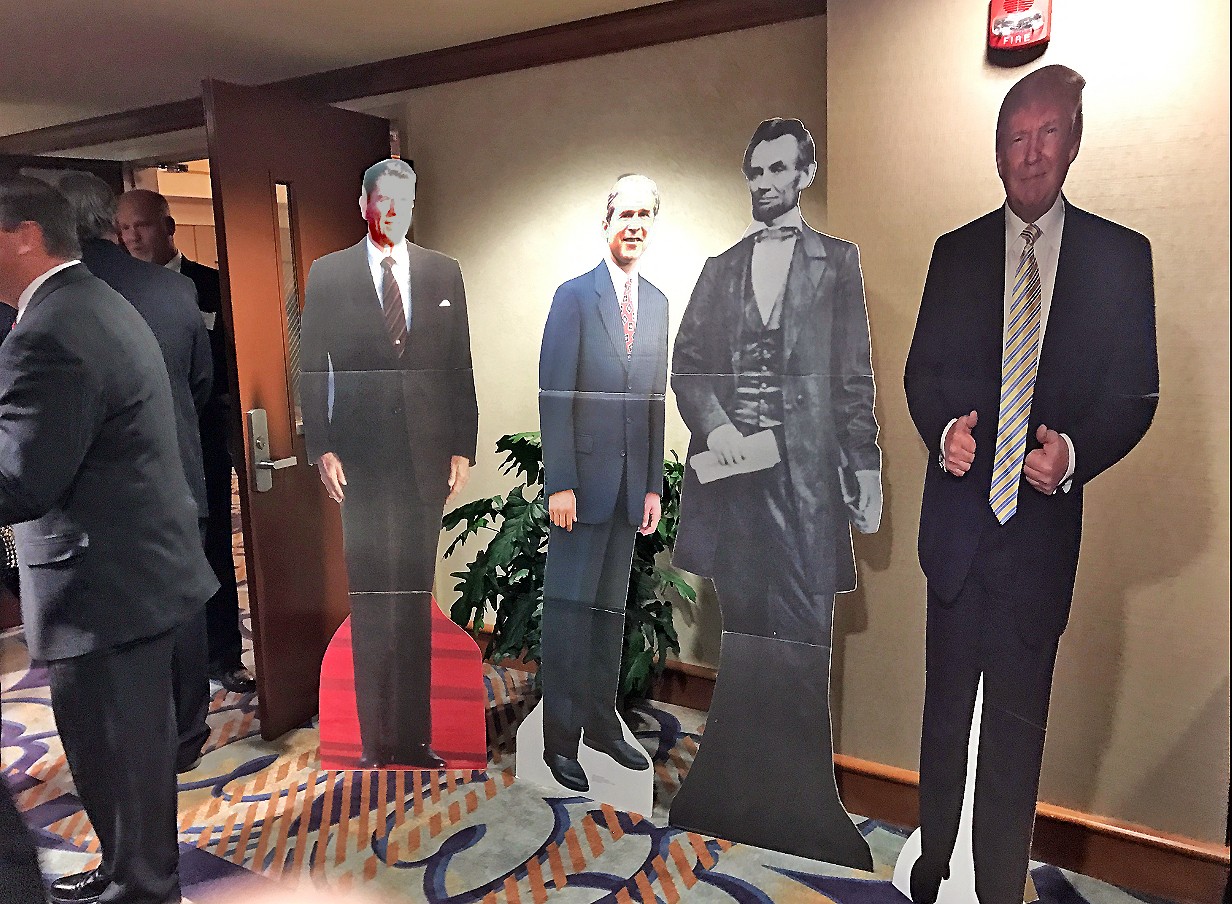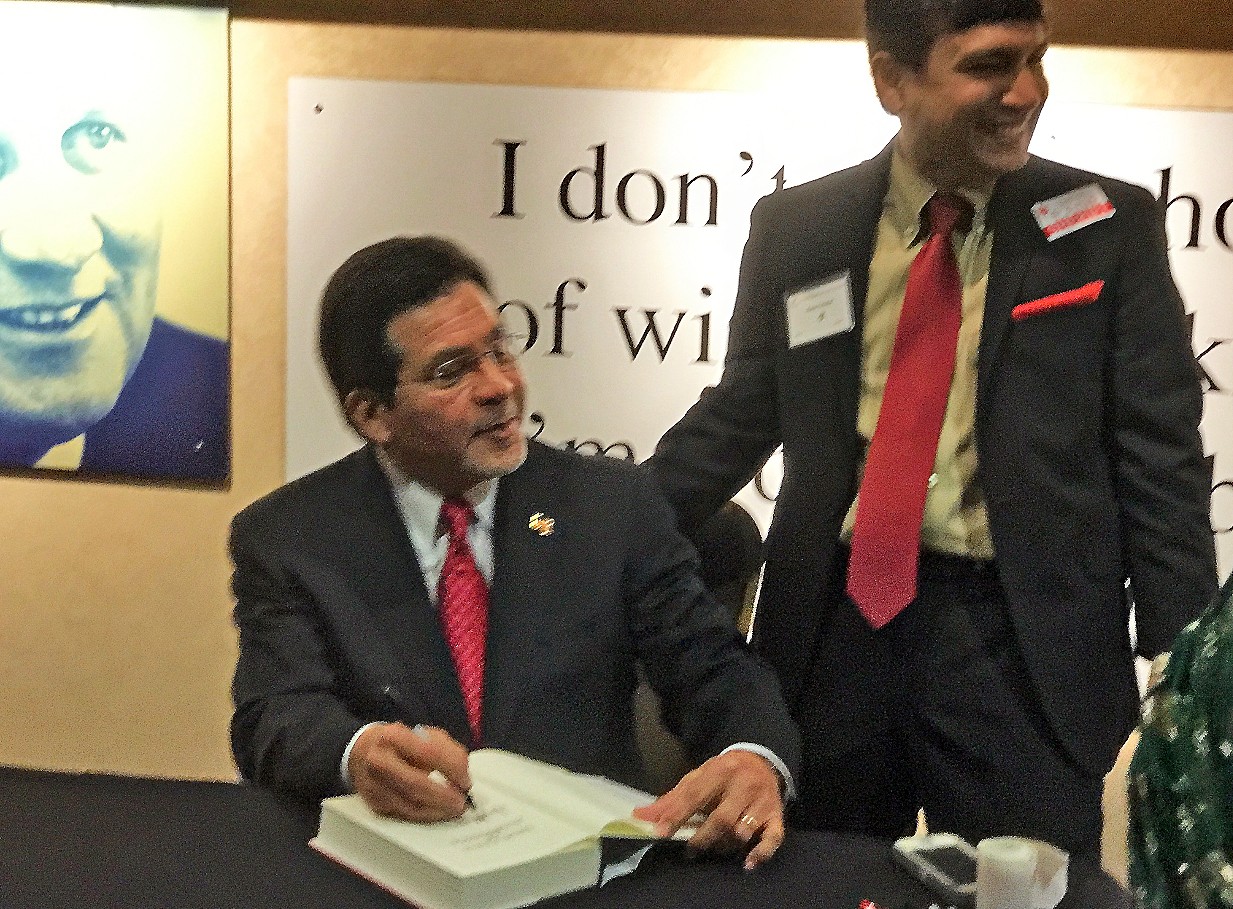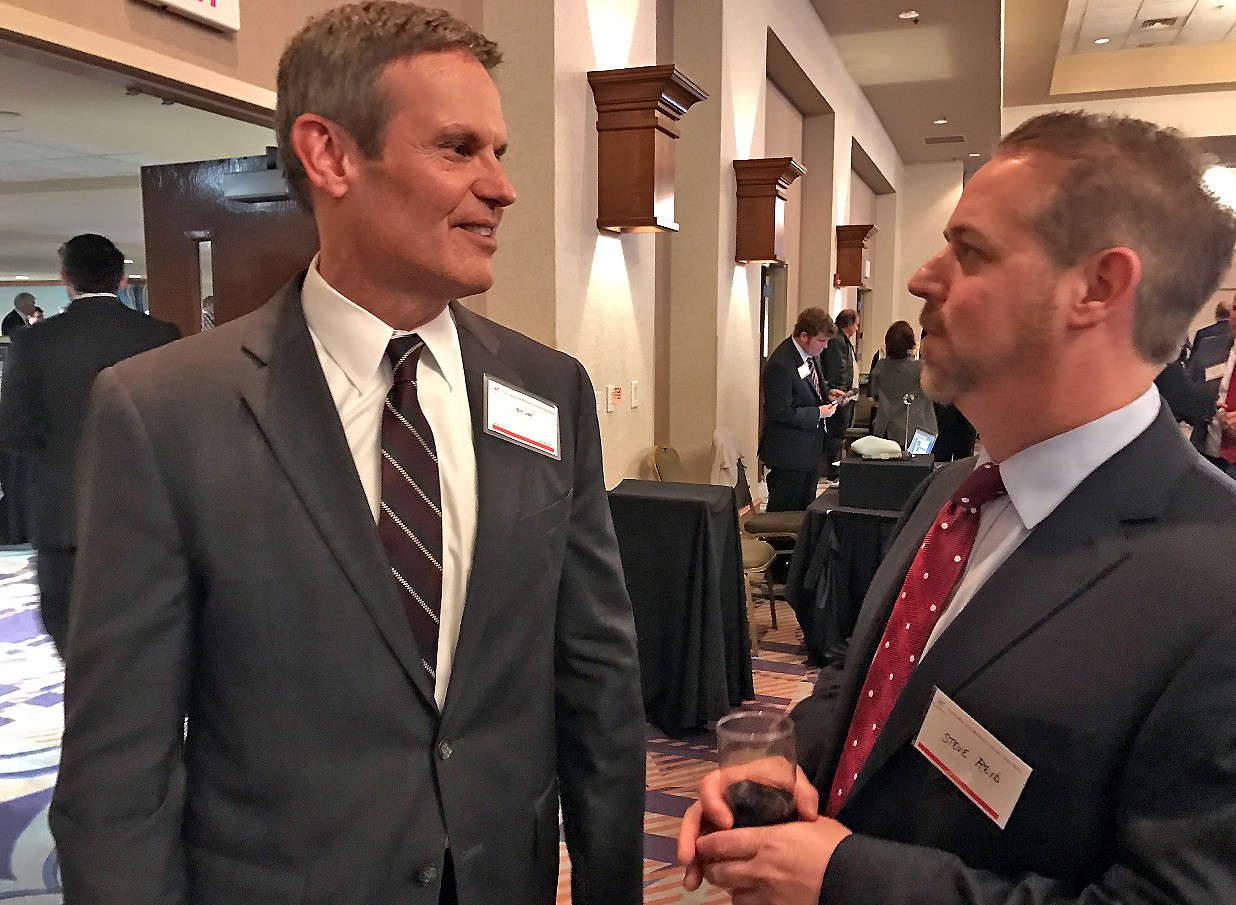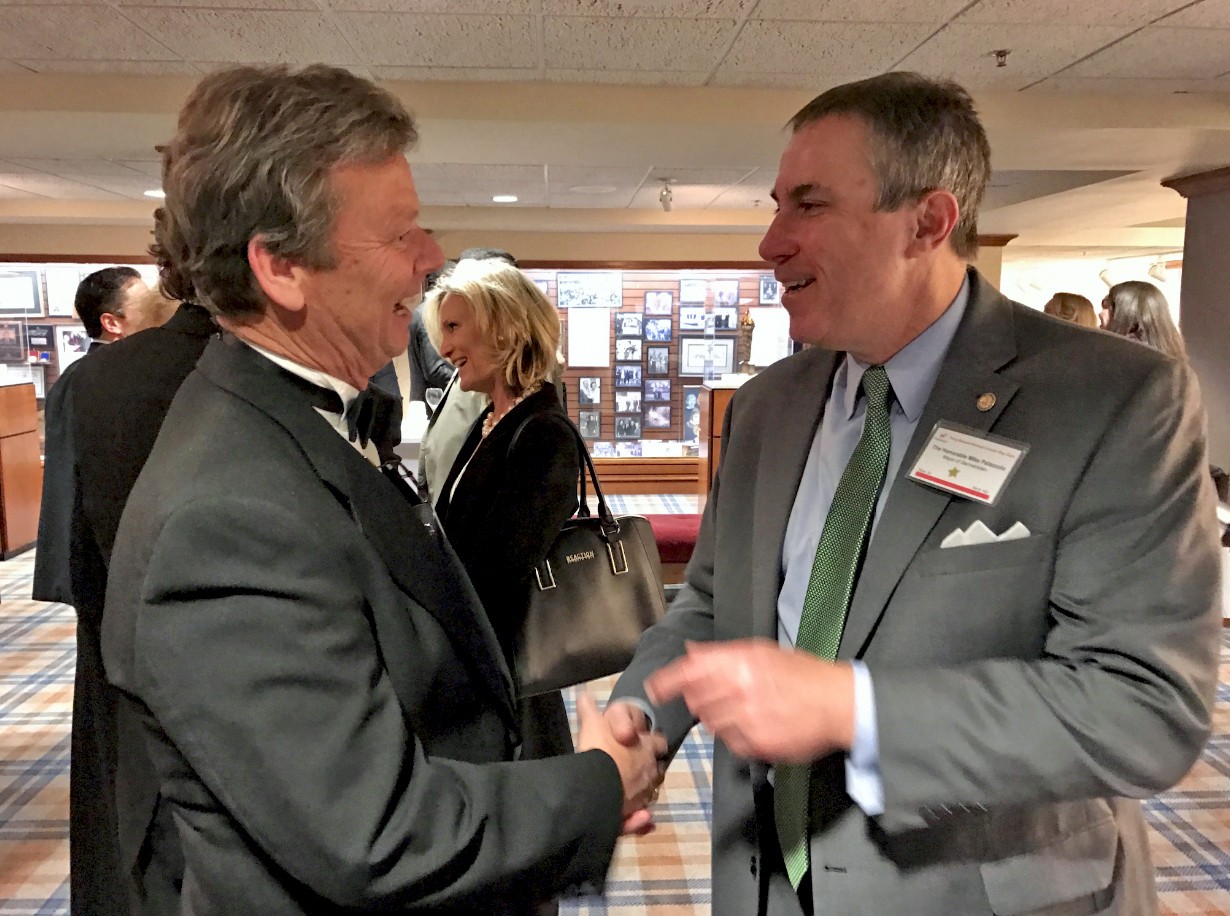Two revelations in particular stand out from Saturday night’s Lincoln Day banquet, the Shelby County Republican Party’s annual ceremonial event.
• JB
JB
Mayor Strickland (r) shmoozing at Lincoln Day
The first concerns Memphis Mayor Jim Strickland, whose busy schedule takes him to any number of after-hours public events of this sort, regardless of their politics. (After a fair amount of hand-shaking and dutiful schmoozing with attendees at the Lincoln Day event, held at the University of Memphis Holiday Inn, the Mayor left early, destined for a Young Democrats event featuring Nashville Mayor Megan Barry.)
The revelation is that Strickland has a personal policy of reading no newspapers and not availing himself of news reports on TV or in social media, as well. Really. “Never,” he insists.
“I find out what I need by going to the source of things, the people I represent,” the Mayor said. He asserted that he has no home subscription to the daily newspaper, for example, though his press assistants, Ursula Madden and Kyle Veazey, keep him briefed on news of importance from that and other sources. As might others in the administration.
Strickland sounded almost like another well-known chief executive when he said the media tend to focus on sensation and irrelevance instead of the actual substance of city government.
That other chief executive, President Donald Trump, figured large, though mainly by cautious and critical indirection, in the remarks of Lincoln Day keynoter Alberto Gonzales, former U.S. Attorney General under President George W. Bush, and currently Dean of Belmont University School of Law in Nashville.
 JB
JB
A presidential quartet at Lincoln Day
•And that’s the other main revelation from Saturday night. At a time when polls show Trump’s approval ratings going south among Democrats and independents but mounting sky-high among Republicans, Gonzales, who underwent ample controversy of his own during his tenure as Attorney General, was more than willing, as one prominent GOP voice, to dissent from party orthodoxy vis-à-vis both Trump and the Republican Congress.
Hardly had Gonzales got beyond the opening courtesies of his address to the Lincoln Day audience when he declared, “We have just endured one of the most remarkable and bitter presidential campaigns in recent memory. Our new President has now begun the business of carrying out an aggressive agenda that he promised the American people, and those efforts have not been without some mis-steps, and I would be less than honest if I said that nothing that has been reported in the press or tweeted directly by the President concerns me.”
 JB
JB
Gonzales signing copies of memoir, ‘True Faith and Allegiance,’ for Republicans at Lincoln Day
Gonzales promptly softened that rebuke by noting “how hard it is to govern a nation as vast and diverse as ours,” that “mistakes are going to happen,” and that “we should be careful about rushing to judgment.” He further acknowledged, “It is a dangerous world, and we need Donald Trump to be strong.”
The former Attorney General then announced he would concentrate his attention on two subjects: immigration and the Supreme Court.
Approaching the subject of immigration “from the standpoint of a grandson of Hispanic immigrants,” Gonzales declared, “Diversity is one of the great strengths of the United States — diversity by the migration of cultures, ethnicities, and ideas.” While paying homage to the need for secure borders, he said that goal was “best achieved not through executive action, but as part of an effective, comprehensive immigration law.”
Gonzales, who had earlier gone public with the notion that Trump’s declaration of an immigration ban had been “botched,” went on to call for a policy that could “accommodate an effective but controlled response to humanitarian crises around the world.
Further Gonzales pronouncements on immigration, all contrasting with the current Trump administration line: “Let there be no question about this. Our government is incapable of forcibly removing 12 million people,” and “mass deportation of millions of workers would hurt our economy.”
Those illegals who have stayed out of trouble and been good citizens, by “paying a fine and back taxes, for example, should be able to remain in the country and obtain some kind of legal status” even to the point of ultimately “qualifying for citizenship.”
Amnesty? The word was given too broad a definition by immigration foes. The wall? Much of the “problem” with illegals in this country results from people who overstay their Visas, and “not even a 50-foot wall is going to address this problem.”
And, as for “the fate of immigrant children brought unlawfully to this country, Gonzales pronounced himself “in favor or comprehensive federal legislation that gives these children [“these dreamers, he would call them] the opportunity to seek legal status.”
All in all, about as thorough a deconstruction of Donald Trump’s immigration policy as could be imagined — though couched here and there with faint praise for the President’s determination “to make America great again” and an insistence that he be given “an opportunity to succeed.”
Pivoting to his other main topic, the United States Supreme Court, the former U.S. Attorney General made a point of praising as “well qualified” former President Obama’s Court nominee of 2016, Merrick Garland and, after chastising Senate Democrats for withholding approval of past Republican nominees, said “I believe that obstruction by Senate Republicans over the Garland nomination was also wrong.”
Gonzales got firmly back on base by praise of Trump’s current Supreme Court nominee, Neil Gorsuch, as “exceptionally well qualified” and called for Senate Democrats to do the right thing by allowing a floor vote where their GOP colleagues had done the wrong thing by refusing to do so with Garland.
In sum, however heterodoxical it was in relation to current GOP strategy, Gonzales’ speech was thoughtful and well received by his local Republican audience. In a sidelight to his remarks, Gonzales had been asked, in  JB
JB
Gubernatorial candidate Bill Lee with pollster/consultant Steven Reid, a campaign associate
a pre-speech chat with reporters, whether he had any interest in joining the growing field of Republicans who intend to run for Governor in 2018. “I’m happy where I’m at,” was the firm response of the Dean of the Belmont Law School.
•If Alberto Gonzales, a transplanted Tennessean, was hesitant to join the crowd of GOP gubernatorial candidates, there were no few Republicans on hand at Lincoln Day who were more than eager to profess their willingness to run. Whether announced or not, these worthies were already running, and their presence attested to the fact.
Among them were U.S. Representative Diane Black (R-6th District), whom Rep. David Kustoff (R-8th District) had described as his “mentor;” state Senator Mark Green (R-Clarksdale); Shelby County’s own state Senator Mark Norris (R-District 32), the Senate majority leader; businessman and recently resigned state director of Economic Development Randy Boyd; and Nashville-area businessman Bill Lee.
(So far, only one major Democrat, former Nashville Mayor Karl Dean, has announced for Governor, via a weekend statement in the Nashville Tennessean, although others are considering a gubernatorial race.)
•Also on hand at Lincoln Day on Saturday, and looking to be in prime shape after a lengthy battle with cancer, was former longtime  JB
JB
Uhlhorn (l) with Germantown Mayor Mike Palazzolo
Germantown alderman Frank Uhlhorn, who pronounced himself a candidate for the now open District 95 seat in the state House of Representatives. That is the seat previously occupied by Curry Todd, who incurred multiple controversies and was ousted in the 2016 election by businessman Mark Lovelll. In his turn, Lovell was forced to resign his office amid charges of untoward sexual conduct (which he denies).
In the short term, Lovell’s successor will be an interim appointee by the Shelby County Commission, which, in a unanimous vote just last week, put prospective candidates on notice that opposition to the currently proposed school-voucher bill in the General Assembly is a de facto prerequisite for appointment.
Uhlhorn, for one, had no trouble with that and declared himself an exponent of public education.
•The voucher bill’s sponsor, state Senator Brian Kelsey (R-District 31), was also at the banquet. He declared himself unfazed by the Commission’s position on the issue. “My concern is for these children who have been condemned to attend failing schools for 13 years in a row, and they need help this year,” Kelsey said, boasting that his bill, with Democratic co-sponsors Sen. Reginald Tate (D-District 33) and state Rep. John DeBerry (D-District 90) had bipartisan support.